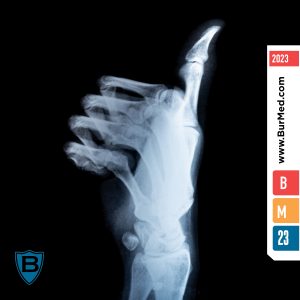The Importance of Radiation Protection Gloves
Safeguarding Orthopedic Surgeons with Burlington Medical’s FreeGuard® and Xguard® Gloves
Orthopedic surgeons face various occupational hazards daily that can cause potential physical injury and mental stress. One major concern is the constant exposure to ionizing radiation during surgical procedures. This blog post highlights the importance of using radiation protection gloves and why healthcare professionals should consider Burlington Medical’s FreeGuard® and Xguard® gloves to minimize the effects of ionizing radiation exposure.
Why is Radiation Protection Important?
Radiation imaging has revolutionized the level of care orthopedic surgeons can provide, allowing for improved intraoperative reduction, alignment, and fixation while preserving efficiency during surgical procedures. However, this also means that surgeons and operating room staff are constantly exposed to ionizing radiation, with predicted effects occurring in an increasing dose-dependent manner over time.
Why is Ionizing Radiation Damaging to Cells?
Ionizing radiation is high-energy, making it capable of removing electrons from atoms and molecules in living tissue. This can create highly reactive ions and free radicals that react with DNA, proteins, and lipids. It can break DNA strands and damage DNA bases, which can cause mutations that can disrupt cell division and growth. Ionizing radiation may also lead to cell death and malfunction, damaging cell membranes, proteins, and other components, dependent on the radiation dose, the tissue’s sensitivity, and shielding.
Unshielded surgeons can perform roughly 250 procedures per year before exceeding the recommended annual radiation dose. Hands, gonads, and legs may absorb up to 5 to 10 times more radiation than other body parts due to partial or complete lack of shielding.
The Potential Effects of Ionizing Radiation
The continued exposure that orthopedic surgeons and operating room staff face regularly can lead to various health risks, including cataracts, thyroid malignancies, and other forms of cancer.
Moreover, younger surgeons are at an even higher risk of developing thyroid malignancies due to their age. As a result, lead collars and other protective gear, such as eyewear, gloves, and aprons, are essential to minimize radiation exposure during fluoroscopy and other procedures.
The Solution: Burlington Medical’s FreeGuard® and Xguard® Gloves
Healthcare professionals must use high-quality radiation protection gloves to minimize radiation exposure and protect themselves. Burlington Medical’s FreeGuard® and Xguard® gloves offer excellent shielding, reducing the amount of radiation absorbed by the hands.
By using these gloves, orthopedic surgeons can reduce the risk of radiation-induced injuries while maintaining a high level of surgical care for their patients. In addition to gloves, personal protection equipment such as lead aprons and collars should always be worn when using fluoroscopy.
The Benefits of Burlington Medical’s Radiation Protection Gloves
Both the FreeGuard® and Xguard® lines are designed to offer a combination of benefits in the operating room, including:
Enhanced Protection
FreeGuard® and Xguard® gloves offer maximum protection against ionizing radiation, ensuring orthopedic surgeons can safely perform their procedures without compromising their health.
Comfort and Dexterity
We make these gloves using high-quality materials that provide comfort and flexibility, enabling surgeons to perform their tasks easily. Their ergonomic design ensures that dexterity is not compromised, allowing precise movements during surgical procedures.
Durability
Burlington Medical builds our radiation protection gloves to last, ensuring that healthcare professionals maximize their investment. By using durable materials and following proper care guidelines, these gloves can maintain their protective qualities over time.
Improved Safety Culture
Incorporating Burlington Medical’s FreeGuard® and Xguard® gloves into the operating room helps promote a culture of safety, emphasizing the importance of radiation protection for all staff members. This can increaseawareness and adherence to safety protocols, reducing radiation exposure risks.
Increase Safety, Improve Patient Care, Prolong Careers
The importance of radiation protection gloves in orthopedic surgery cannot be overstated. Burlington Medical’s FreeGuard ® and Xguard ® gloves offer a reliable and effective solution, minimizing radiation exposure and safeguarding the health of surgeons and operating room staff. By investing in these gloves, healthcare professionals can focus on providing the best possible care for their patients while also caring for their own well-being.
In addition to using radiation protection gloves, surgeons should remain vigilant about C-arm management and positioning and employ best practices to minimize radiation exposure. By combining personal protective equipment with proper techniques, orthopedic surgeons can prolong their careers while maintaining the highest standards of patient care.
Explore our full line of radiation protection gloves and order your own today!
To Find Your Pair Click Here!
- Giordano, B. D., Ryder, S., Baumhauer, J. F., & DiGiovanni, B. F. (2014). Exposure to direct and scatter radiation with use of mini-c-arm fluoroscopy. The Journal of Bone and Joint Surgery, 96(8), e68.
- Hayda, R. A., Hsu, R. Y., DePasse, J. M., & Gil, J. A. (2018). Radiation exposure and health risks for orthopaedic surgeons. The Journal of the American Academy of Orthopaedic Surgeons, 26(7), 227-233.
- Tsalafoutas, I. A., Koukorava, C., Kaliakmanis, A., Pneumaticos, S., & Tsoronis, F. (2007). Estimation of radiation doses to patients and surgeons from various fluoroscopically guided orthopedic surgeries. Radiation protection dosimetry, 123(4), 482-488.
- Vano, E., Kleiman, N. J., Duran, A., Rehani, M. M., Echeverri, D., & Cabrera, M. (2010). Radiation cataract risk in interventional cardiology personnel. Radiation research, 174(4), 490-495.
- International Commission on Radiological Protection (ICRP). (2012). ICRP statement on tissue reactions and early and late effects of radiation in normal tissues and organs – threshold doses for tissue reactions in a radiation protection context. ICRP Publication 118. Annals of the ICRP, 41(1-2), 1-322.
- Patel K, Judd H, Harm RG, Spanyer J. Occupational Hazards for the Practicing Orthopaedic Surgeon: A Standard Review. J Am Acad Orthop Surg. 2022 Apr 1;30(7):e607-e616. doi: 10.5435/JAAOS-D-21-00612. PMID: 35171850.

